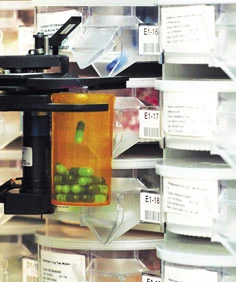
ScriptPro, a manufacturer of automated pill-dispensing systems for pharmacies, was one of the early adopters of direct digital manufacturing (DDM), having employed the process for several years before it became a more widespread technique.
ScriptPro uses a Fortus 3D Production System to manufacture selected parts for the pill-dispensing systems.
Automating the vial (i.e. pill bottle) filling process allows pharmacists to spend more time counseling patients. And, prescription wait times are reduced, leading to greater customer satisfaction for the pharmacy. The system communicates with the pharmacy computer to fill, label and deliver up to 150 prescriptions per hour. One such system, the SP 200, is expected to fill from 60% and 80% of the prescriptions in most pharmacies.
The machine is comprised of three sections: robotics cabinet, electrical cabinet, and control center. A robotic arm picks up a vial, takes it to the dispensing cell for filling, then places it on a conveyor. The conveyor stops long enough to add the label, then moves the vial into a collated-collection station that places the vials in order by patient name or status.
One of the challenges in designing and manufacturing the robotic dispenser was the large variety of vial sizes available to pharmacies. Although most pharmacies use just a few vial sizes for the majority of their pills, they may select from several manufacturers' products - meaning ScriptPro's machines must support a variety of vial types and be easily customizable.
The most critical component of the SP 200 is the bezel that accepts the vial. The bezel is designed so that the user cannot put the wrong vial into the machine. Each SP 200 has three vial receptacles and six bezels to accommodate a variety of vial sizes.

DDM speeds up part production.
REAL SOLUTION ScriptPro's Fortus system employs fused deposition modeling (FDM) technology to produce parts. Using FDM, each bezel is manufactured to precise tolerances to accept only one vial size.
According to Bill Thomas, VP of Manufacturing for ScriptPro, "Once we were through with the prototyping stage, we immediately began to use the Fortus system for Direct Digital Manufacturing (DDM) of the bezel. Not only were the tolerances in line, but there was little to no required post production work, like sanding or painting. We produce the vial bezels, wash them, and install them on the machines. Aesthetics are very important, and the surface quality is excellent." Although ScriptPro had limitations due to the cabinet size, the bezel was easily designed to fit the space available.
It was also designed to be extra rugged, so that it could prevent a person from forcing the wrong size vial into the bezel. So far, 56 vial types are supported by ScriptPro.
"Since we do not know which bezel will be needed for which machine until it is ordered, using FDM for direct digital manufacturing has saved us the cost of producing stock, and it can produce parts within a day or two," Thomas says.
Although the per-part cost is higher with DDM, the elimination of machining and tooling results in significant overall savings. Based on ScriptPro's median annual machine production volume, it estimates that bezel production would cost $5,100 more with DDM - however, the elimination of tooling would save approximately $30,000, for a net savings of $24,900, or 79%.
"If we had gone the traditional route of designing the part, then designing the tooling to build the part, then having the part injection molded, it would have required time and money every time we made a change," Thomas explains. "As it is, we made changes even after the first components were manufactured, at no additional tooling or molding costs." Plus the company can easily adapt to other vial manufacturers' products within a minimum amount of time.

Changes to ScriptPro’s automated pill-dispensing system are done quickly with FDM and DDM.
"Flexibility is, by far, the strongest feature of the Fortus system," Thomas says. "We can experiment with product design, test it, and make changes without having to go to tooling. And then we can start getting production parts within a few days, versus what could extend into months. Having no outside vendor to deal with is another benefit of DDM.
We had a savings of about $30,000 on engineering time and tooling for the bezel alone. Add in the other parts, and the machine paid for itself within months of our purchase."
Stratasys Inc.
Fortus 3D Production Systems
Eden Prairie, MN
stratasys.com

Explore the May 2009 Issue
Check out more from this issue and find your next story to read.
Latest from Today's Medical Developments
- Arcline to sell Medical Manufacturing Technologies to Perimeter Solutions
- Decline in German machine tool orders bottoming out
- Analysis, trends, and forecasts for the future of additive manufacturing
- BlueForge Alliance Webinar Series Part III: Integrate Nationally, Catalyze Locally
- Robot orders accelerate in Q3
- Pro Shrink TubeChiller makes shrink-fit tool holding safer, easier
- Revolutionizing biocompatibility: The role of amnion in next-generation medical devices
- #56 Lunch + Learn Podcast with Techman Robot + AMET Inc.





